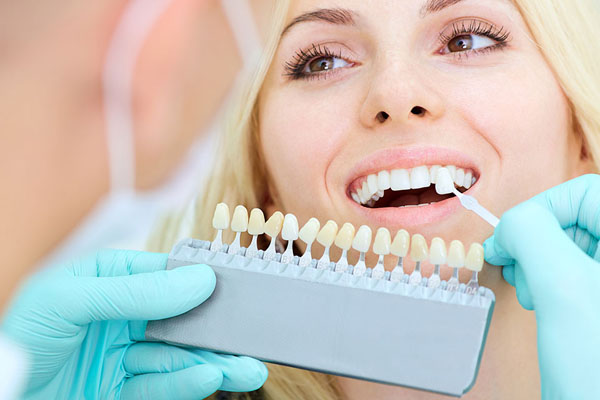Porcelain Veneers Candidacy
Are Porcelain Veneers the Best Option for You?
Porcelain veneers are a popular cosmetic dental procedure that can dramatically improve the appearance of your teeth. They’re custom-made, thin shells bonded to the front surface of your teeth to create a natural-looking, beautiful smile. If you’re considering porcelain veneers, it’s important to understand the process and whether or not you qualify for this treatment.
Our Dearborn dentist breaks down the ideal candidates for porcelain veneers below. To schedule a consultation, call our dental office at (313) 914-4440.

Do You Qualify for Porcelain Veneers?
Most patients qualify for this stunning cosmetic dental treatment. Porcelain veneers may be an option for you if you’re looking to conceal any of the following cosmetic imperfections:
- Stained or discolored teeth
- Chipped or cracked teeth
- Misshapen or crooked teeth
- Gaps between your teeth
- Teeth that are too small or too large
- Worn-down teeth
Factors that Affect Candidacy
Overall Oral Health
Before getting porcelain veneers, you need to be in good oral health. If you have gum disease or other oral health problems, you may not be a good candidate for this treatment. We recommend addressing any oral health concerns before undergoing a veneer treatment.
Tooth Structure
Your teeth must have enough structure to support the veneers. If your teeth are severely damaged or decayed, you may need to consider other treatments, such as dental crowns or dental implants. You also need to have an adequate amount of tooth enamel to support the veneers.
Teeth Grinding
If you grind your teeth, you may not be a good candidate for porcelain veneers. Grinding can damage the veneers and cause them to break or become dislodged.
Bite alignment
If you have a misaligned bite, you may not be a good candidate for porcelain veneers. Veneers can change the shape and size of your teeth, but they cannot correct issues with your bite.
How Long Do Porcelain Veneers Last?
Porcelain veneers can last anywhere from 10 to 20 years, depending on the individual case. With proper care and maintenance, some porcelain veneers can even last up to 25 years. However, it’s important to note that the lifespan of porcelain veneers can vary from person to person and from case to case. Some people may need to replace their porcelain veneers sooner than others due to various factors.
Factors That Affect Longevity
Various factors affect how long porcelain veneers last, including:
- Oral Hygiene Habits: Good oral hygiene is essential for the longevity of porcelain veneers. Poor oral hygiene can lead to gum disease, which can cause the veneers to fail. Make sure you’re brushing your teeth twice a day, flossing regularly, and visiting your dentist biannually.
- Bite Forces: Teeth grinding and clenching can put excessive pressure on porcelain veneers, causing them to crack or chip. Wearing a nightguard can help protect the veneers from these forces.
- Diet: A diet high in sugar and acidic foods can cause the veneers to deteriorate over time. Limiting the consumption of these foods can help prolong the lifespan of porcelain veneers.
- Smoking: Smoking can stain and discolor porcelain veneers, reducing their lifespan.
- Accidents or Trauma: Accidents or trauma to the face can cause the porcelain veneers to crack or chip, requiring replacement.
- Quality of Materials: High-quality materials and proper placement techniques can significantly improve the longevity of porcelain veneers.
Porcelain Veneer Alternatives
If porcelain veneers aren’t quite right for you, there are a few other cosmetic alternatives to consider.
Teeth Whitening
Teeth whitening can improve the brightness of your smile in just a few short visits to the dentist. Some dentists even offer in-office treatments as well as take-home whitening kits. However, teeth whitening may not be suitable for those with dental restorations, such as dental crowns.
Lumineers
Lumineers can be a great alternative for those looking for a less invasive option. Since they’re thinner than porcelain veneers, they don’t typically require any tooth enamel shaving or grinding. They’re placed directly on your teeth, giving you a renewed appearance.
Orthodontic Treatment
Some dental issues can’t be fixed with porcelain veneers. For those with severe misalignment or bite problems, you may need orthodontic treatment. Your dentist may recommend traditional braces or Invisalign to help you correct your smile alignment.
Dental Crowns
Dental crowns are placed over damaged or decayed teeth to restore function and appearance. They’re designed to match the appearance of a natural tooth and can be made from various materials.
Frequently Asked Questions
Is it possible to replace or repair porcelain veneers if they become damaged?
Yes, in most cases, damaged porcelain veneers can be replaced or repaired. However, the extent of the damage will determine the appropriate course of action. Minor chips or cracks can often be repaired, while extensive damage may require replacing the veneer altogether.
Do veneers make your breath stink?
No, veneers shouldn’t cause your breath to stink. However, if your veneers aren’t cleaned and maintained properly, oral bacteria can build up on and around them, causing bad breath.
Determine Your Candidacy for Porcelain Veneers
Porcelain veneers can be a great option for improving the appearance of your teeth. However, it’s important to consider whether or not you’re a good candidate for this treatment. To determine if porcelain veneers are the best treatment for you, contact our dentist in Dearborn today to schedule your appointment.

